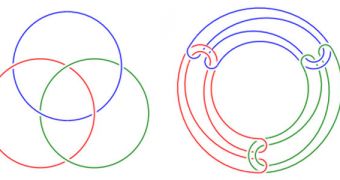According to an announcement made today, December 16, we may be a short distance away from discovering entirely new states of matter, as well as laws of physics that have never been observed before. The prediction is rooted in a decades-old theory.
Vitaly Efimov, now based at the University of Washington in the US, was in 1970 a young physicist working for Soviet Russia. At that time, he made a counterintuitive prediction that raised a lot of eyebrows.
He proposed that some quantum objects that are incapable of forming into pairs can instead hoop up intro triplets. His idea was proven by Austrian physicists in 2006, when the Efimov state was determined to exist in a mixture of cold cesium atom gas.
One of the most interesting things about the discovery is that, while the bonds holding the triplets together appeared similar to the ones holding pairs at first sight, subtle and important differences in fact existed, that completely changed the structures' behavior.
Building up on this background, an expert at the Norwegian University of Science and Technology (NUST) today proposes that the same type of bonds that hold cesium atoms together may allow for other, weirder structures to appear.
What physicist Nils Baas is saying is that the strange bonds could underlie the grouping of four or more atoms as if they were in pairs, Technology Review reports.
This idea made Baas say that experts are currently on the verge of discovering an entirely new from of matter, that may be governed by a previously-unknown set of natural laws.
The researcher bases his idea on results of equations obtained in a field of mathematics called topology, which is responsible for the study of shapes. Apparently, the math behind quantum mechanics and topology are quite similar.
Baas also gave an analogy for his work, comparing the proposed state of matter with the famous Borromean ring, a 3D figure made up of three circle in which cutting one of them releases the other two.
One thing about this ring though is that it cannot exist in two dimensions. But, if you introduce an extra one, things all of a sudden change. The same can be true for bonds between atoms, the expert says.
At one point, Nobel Prize-winning physicist Murray Gell-Mann said that “everything not forbidden is mandatory.” He was talking about quantum physics.
In short, what he meant was that if there's no reason to believe something is impossible in the way particles may interact, than those interactions surely happen.

 14 DAY TRIAL //
14 DAY TRIAL //